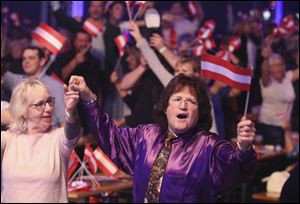
EDITORIAL
An unfortunate right turn for Eastern Europe
12/22/2017

Supporters of the Freedom Party celebrate in Vienna, Austria, Sunday, Oct. 15, 2017, after the closing of the polling stations for the Austrian national elections.
The resurgence of what is being called euphemistically right-wing populism in Eastern Europe, including in Austria, Hungary, and Poland, is hard to understand, given the history of that region with authoritarian governments over the years.
An alternate interpretation, that the people of that region are only comfortable being ruled by authoritarian governments, short on freedom and civil rights, is not complimentary to them. Nor does it make their governments easily compatible with the general principles that reign within the European Union, of which most of them are members.
Click here to view more Blade editorials
Nor is the analysis that says that the form of government that they seem to favor, at least to a degree, is a result of valid fear. The chest-beating of Russian president Vladimir Putin does not accurately reflect his country’s real military and economic strength that would cause the Eastern Europeans to perceive Russia as an existential threat to them, justifying a hard government in their own capitals capable of resisting their big neighbor to the east. There is some importance being attached to President Trump’s backing away to a degree from NATO, which guarantees the Eastern European members’ security, but that doesn’t justify right-wing governments by the threat to them his position indicates.
Nor is the Muslim threat to them and to what they see as their basically Christian societies, through immigration, large enough to validate heavy-handed nationalistic agendas on the part of their leaderships.
Nonetheless, absent a firm ideological basis, governments in, notably and recently, Austria and Poland have turned fairly sharply right in their composition and actions, disquieting their fellow E.U. members as well as the rest of the world that cares.
The new Austrian party coalition includes representatives of the so-called Freedom Party, a body formed after World War II by ex-Nazis. The Freedom Party is not the majority party in the coalition, but is it possible that the Austrians have forgotten that Adolf Hitler was born Austrian and where that approach got them? Austrian voters are free to choose democratically anyone they like as their leaders, and they did choose ex-Nazi Kurt Waldheim as president at one point, but is that really what they want the world to think of when they think of Austria?
The right-wing Polish government has just challenged E.U. norms of democracy in bringing the country’s court system under the ruling Law and Justice party. Between the two 20th century world wars the Poles had Marshal Jozef Pilsudski, among others, as head of state, and Polish pogroms against Jews occurred. After World War II they had the Communists imposed on them. Then, with the Soviet Union out of the way, they had what looked like a period of freedom. So why are they doing this now?
The best guarantee for Eastern Europeans of security, economic growth, and respect in the world is the maintenance by reasonable governments of free, democratic societies, worthy of support by America, NATO, the E.U. and the rest of Europe.